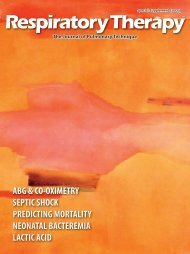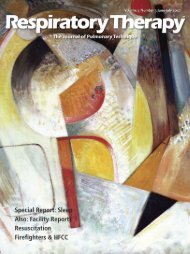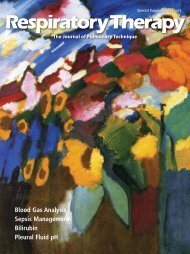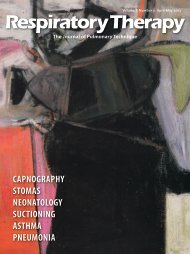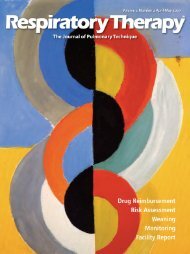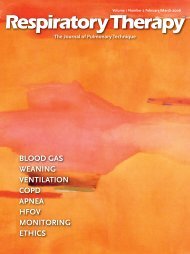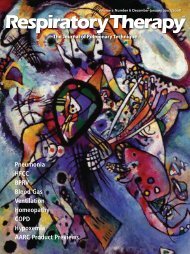RT 02-03 JJ07 main web - Respiratory Therapy Website
RT 02-03 JJ07 main web - Respiratory Therapy Website
RT 02-03 JJ07 main web - Respiratory Therapy Website
Create successful ePaper yourself
Turn your PDF publications into a flip-book with our unique Google optimized e-Paper software.
the expense of deep slow wave sleep (stages 3 and 4) and REM<br />
sleep. Slow wave sleep is sometimes even completely abolished.<br />
However clinically, patients are often not aware of this<br />
repetitive sleep interruption (with sometimes hundreds of<br />
arousals during one night), but simply do not feel restored in the<br />
morning. Other nocturnal symptoms can include restlessness,<br />
nocturia, excessive salivation and sweating, gastroesophageal<br />
reflux, as well as headache and dry mouth or throat in the<br />
morning on awakening.<br />
The extent to which daytime functioning is affected generally<br />
depends on the severity of OSA. Symptoms other than EDS<br />
which greatly impact daytime functioning are<br />
neuropsychological symptoms such as irritability, difficulty<br />
concentrating, cognitive impairment, depressive symptoms, and<br />
other psychological disturbances. Thus, OSA can easily mimic<br />
symptoms of a major depressive episode.<br />
Correlation studies of OSA and depression<br />
Among the first studies investigating the relation between OSA<br />
and depression, Guilleminault et al. 10 reported that 24% of 25<br />
male patients with OSA had previously seen a psychiatrist for<br />
anxiety or depression, and Reynolds et al. 11 showed that around<br />
40% of 25 male OSA patients met the research diagnostic criteria<br />
for an affective disorder, with a higher risk of depression in<br />
those patients who were sleepier during the day. Similarly,<br />
Millmann et al. observed that 45% of his 55 OSA patients had<br />
depressive symptoms on the Zung Self-Rating Depression Scale,<br />
with the group scoring higher for depression also having a<br />
significantly higher AHI. 12 Whereas only 26% of OSA patients<br />
described themselves as currently depressed, 58% fulfilled DSM-<br />
III criteria for major depression of four or more depressive<br />
symptoms. 13 Others observed increased depression scores on<br />
the Minnesota Multiphasic Personality Inventory (MMPI) in<br />
patients with OSA. 14,15 Indeed, Ramos Platon et al. found<br />
elevations in several MMPI scales in 23 OSA patients (moderate<br />
to high severity) compared to 17 controls. 16 Aikens et al. 17<br />
showed that 32% of their OSA patients had elevated depression<br />
scores on the MMPI and in the same series of studies, there<br />
were twice as many OSA patients with elevated depression<br />
scores than age and sex matched primary snorers. 18 However,<br />
the percentage of depressive symptoms was not significantly<br />
different when compared to patients with other primary sleep<br />
disorders, such as periodic limb movements during sleep<br />
(PLMS). 19 Most recently, in an epidemiological study of 18,980<br />
subjects representative of the general population in their<br />
respective countries (UK, Germany, Italy, Portugal, and Spain)<br />
and assessed by cross-sectional telephone survey, Ohayon<br />
determined that 17.6% of subjects with a DSM-IV breathingrelated<br />
sleep disorder diagnosis also presented with a major<br />
depressive disorder diagnosis, and vice versa. 20 This correlation<br />
persisted after controlling for obesity and hypertension.<br />
In contrast to the numerous studies observing a positive<br />
correlation between OSA and depression, some investigations<br />
found no association between both disorders. In a 5-year<br />
longitudinal study, Phillips et al. did not find any significant<br />
depressive symptoms in elderly patients with a relatively mild<br />
OSA (AHI>5/h), when compared to a control group without OSA<br />
(AHI




